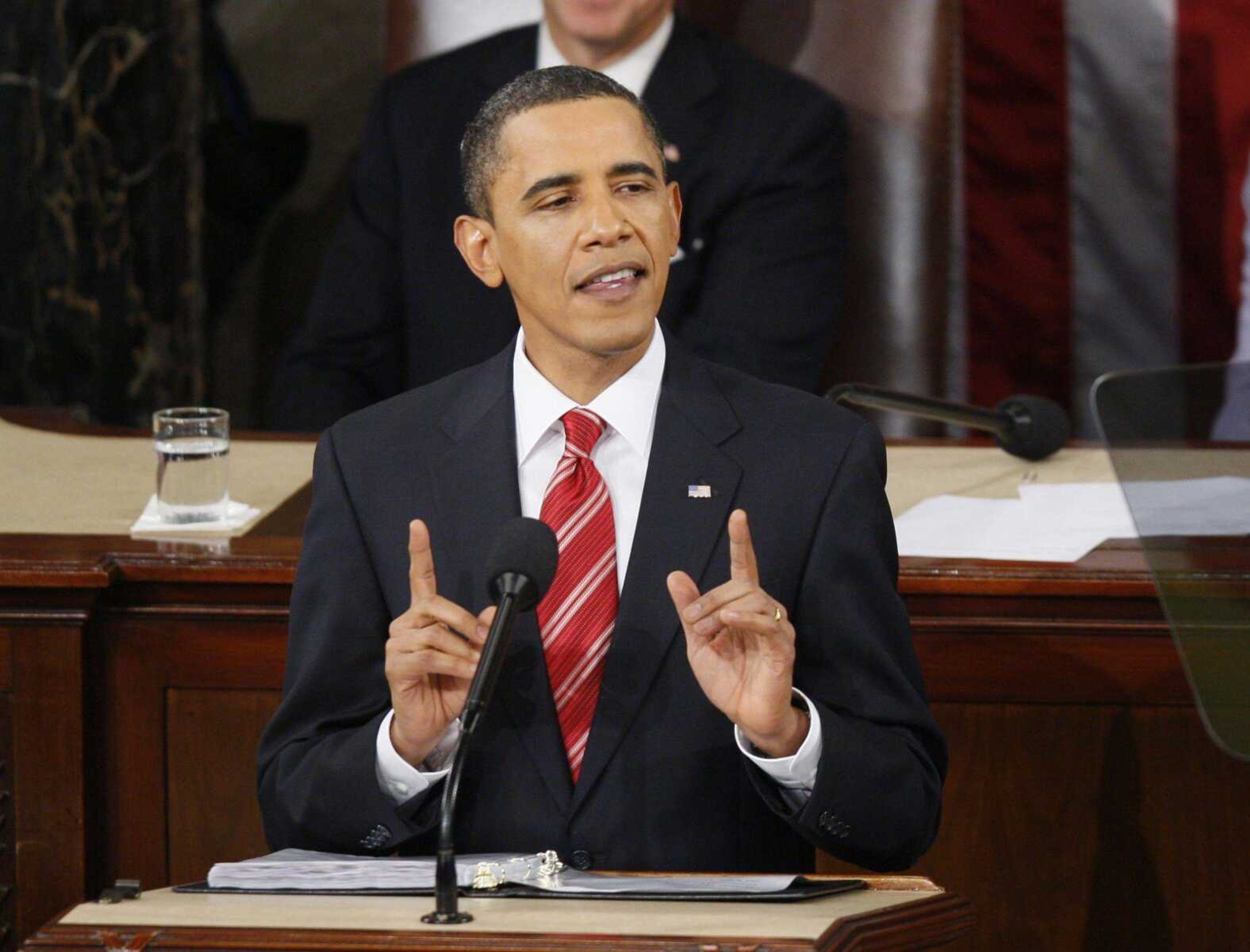Obama declares in speech, 'I don't quit'
WASHINGTON -- Declaring "I don't quit,"' President Barack Obama vowed in his first State of the Union address Wednesday night to make job growth his topmost priority and urged a divided Congress to boost the economy with a new burst of stimulus spending. Despite setbacks, he said he would not abandon plans for longer-term fixes to health care, energy, education and more...
WASHINGTON -- Declaring "I don't quit,"' President Barack Obama vowed in his first State of the Union address Wednesday night to make job growth his topmost priority and urged a divided Congress to boost the economy with a new burst of stimulus spending. Despite setbacks, he said he would not abandon plans for longer-term fixes to health care, energy, education and more.
"Change has not come fast enough," Obama acknowledged before the House chamber and a TV audience of millions. "As hard as it may be, as uncomfortable and contentious as the debates may be, it's time to get serious about fixing the problems that are hampering our growth."
Obama looked to change the conversation from how his presidency is stalling -- over the health care debate, the economy and the missteps that led to Christmas Day's barely averted terrorist disaster -- to how he is seizing the reins.
With State of the Union messages traditionally delivered at the end of January, Obama had one of the presidency's biggest platforms just a week after Republicans scored an upset takeover of a Senate seat in Massachusetts. With the turnover erasing Democrats' Senate supermajority needed to pass most legislation, it also put a cloud over health care and the rest of Obama's agenda.
A chief demand was for lawmakers to press forward with his health care overhaul, which is in severe danger in Congress. "Do not walk away from reform," he implored. "Not now. Not when we are so close."
Republicans applauded the president when he entered the chamber. But the warm feelings of bipartisanship disappeared early.
Democrats jumped to their feet and roared when Obama said he wanted to impose a new fee on banks, while Republicans sat stone-faced. Democrats stood and applauded when Obama mentioned the economic stimulus package passed last February. Republicans just stared.
On national security, Obama proclaimed some success, saying that "far more" al-Qaida terrorists were killed under his watch last year in the U.S.-led global fight than in 2008.
Hoping to salve growing disappointment in a key constituency, Obama said he would work with Congress "this year" to repeal the ban on gays and lesbians serving openly in the military. But in a concession to concern about the move among Republicans and on his own party's right flank, Obama neither made a commitment to suspend the practice in the interim nor issued a firm deadline for action.
The president devoted about two-thirds of his speech to the economic worries foremost on Americans' minds. "The devastation remains," he said.
Obama emphasized his ideas, some new but mostly old and explained anew, for restoring job growth, taming budget deficits and changing a Washington so polarized that "every day is Election Day." These concerns are at the roots of voter emotions that once drove supporters to Obama but now are turning on him as he governs.
Declaring that "I know the anxieties" of Americans struggling to pay the bills while big banks get bailouts and bonuses, Obama prodded Congress to enact a second stimulus package "without delay," specifying it should contain a range of measures to help small businesses and funding for infrastructure projects. Also, fine tuning a plan first announced in October, Obama said he will initiate a $30 billion program to provide money to community banks at low rates, provided they agree to increase lending to small businesses. The money would come from balances left in the $700 billion Wall Street rescue fund -- a program "about as popular as a root canal" that Obama made of point of saying he hated.
Acknowledging frustration at the government's habit of spending more than it has, he said he would veto any bills that do not adhere to his demand for a three-year freeze on some domestic spending (while proposing a 6.2 percent, or $4 billion, increase in the popular arena of education). He announced a new, though nonbinding, bipartisan deficit-reduction task force (while supporting a debt-financed jobs bill). And he said he would cut $20 billion on inefficient programs in next year's budget and "go through the budget line by line" to find more.
In a shift from Obama's past addresses, foreign policy took a relative back seat.
It came behind the economy and was largely devoid of new policy. And Obama made no mention of three of the toughest challenges he faced in his first year: failing to close the terrorist prison compound at Guantanamo Bay, Cuba, failing to get Israel and the Palestinians to resume peace negotiations, and struggling with the al-Qaida havens in Pakistan that are at the core of the terrorist threat to America.
The president will travel to Florida today to announce $8 billion in grants for high-speed rail development, to Maryland on Friday to a House Republican retreat, and to New Hampshire Tuesday to talks jobs.
Connect with the Southeast Missourian Newsroom:
For corrections to this story or other insights for the editor, click here. To submit a letter to the editor, click here. To learn about the Southeast Missourian’s AI Policy, click here.








